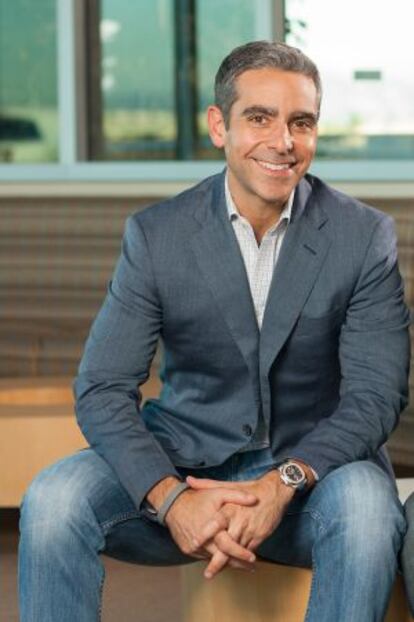“In the future, money will be invisible”
PayPal chief David Marcus explains to EL PAÍS where cashless payments are headed


A Frenchman has brought the entrepreneurial spirit back to PayPal.
David Marcus joined the company in August 2011, after PayPal bought Zong, the mobile-payment business he had founded. The following year he was appointed president.
The 40-year-old businessman with a Geneva education now heads one of Silicon Valley's leading corporations, with annual revenues of six billion dollars.
The online payment company has innovated more in the last year than in the last five years put together. One of the latest features is PayPal Beacon, a small piece of hardware that lets customers make hands-free payments at participating stores via an app on their smartphones.
Despite the flurry of mobile payment methods and virtual currency being developed left and right, including Google Wallet and Bitcoin, Marcus did not seem concerned about the competition during an interview with EL PAÍS at the PayPal headquarters in San José, California.
Question. How will we pay in the future?
Answer. Money will be invisible. There will be no bills, no wallets, just value that will be available for you when you need it, and which you will be able to transfer to any part of the world at a low cost.
Q. Of the world and beyond, because in June you launched PayPal Galactic... what for?
A. We are still focused on this planet, but we also have the right to dream. PayPal Galactic wants to provide an answer to the space tourism industry, which is taking off now.
Q. Operators and smartphone manufacturers seem to trust the NFC (Near Field Communication) system for contactless transactions. Is this your most direct competition?
A. The CEO of a major company called NFC "Not For Commerce." NFC does not solve any of your problems.
Q. Google, Apple and Amazon, among others, are developing their own payment systems with their own stores. Does PayPal feel threatened?
A. The important thing is that we are the only company that processes online digital payments. The rest of the companies you mention handle payments in order to achieve something else. For some the goal is to collect data, for others it is about standing out from the competition. But only if you really focus on it can you make it work. We have nearly 140 million active users around the world (2.5 million in Spain) and we are present in 193 countries. In the last six months we've launched many products. We are experiencing a great internal transformation here at PayPal.
Q. PayPal has earned the hardest part about money transactions: trust, even when there are failed operations. But where's the limit?
A. It is very difficult to protect our clients from crowdfunding. Some day, somebody will show up with the brilliant idea for a time machine, and thousands of people will pay for this product. And we will protect them. But it's forcing us to change our policies. If clients want to participate in a crowdfunding venture, they need to accept that the risk is theirs, not PayPal's.
Q. Will PayPal accept the virtual currency bitcoin?
A. I don't know whether we will see that soon; that's not for us to say. If the regulators approve it, then why not?







































